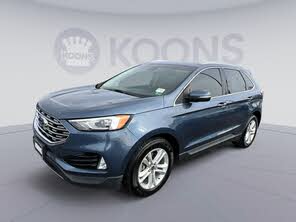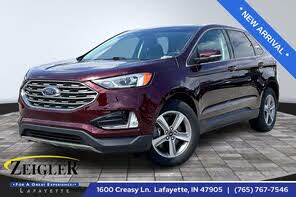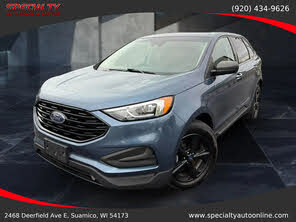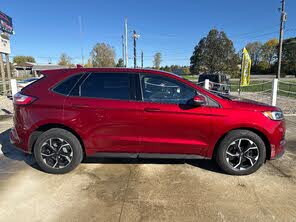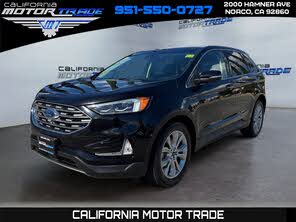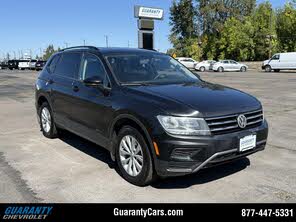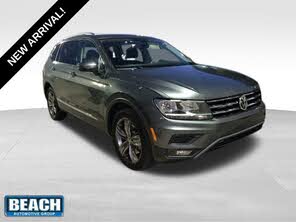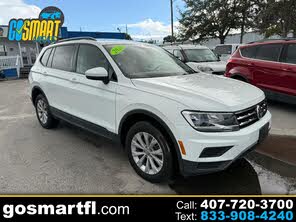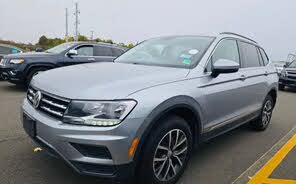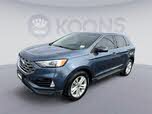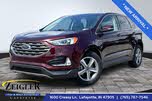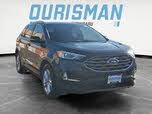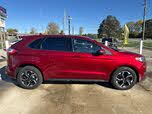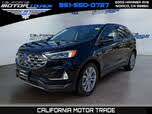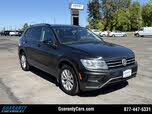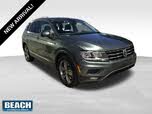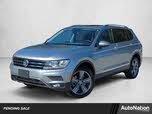2019 Ford Edge vs 2020 Volkswagen Tiguan
Overview | |
MSRP$29,995 | MSRP$24,945 |
Listings1081 | Listings907 |
Ratings & Reviews | |
User Reviews | User Reviews |
Expert reviews7.3 out of 10 | Expert reviews7.7 out of 10 |
Pros
Cons
| |
2019 Ford Edge Reviews SummaryThe Edge was a key vehicle in the evolution of the family SUV market when Ford first introduced it for the 2007 model year. Back then, automakers were experimenting with just what a “crossover” could constitute—look at the Pontiac Aztec and first-generation Chrysler Pacifica if you disagree. But with the Edge, the midsize, two-row SUV template started to take shape. Ford offers the 2019 Edge with an ST trim, grafting performance onto the utilitarian Edge blueprint. But that begs a question—can a vehicle still be good at family hauling and commuting while also delivering speed and performance? | |
2020 Volkswagen Tiguan Reviews SummaryThe Volkswagen Tiguan is one of only two compact crossover SUV’s that currently offer third-row seating. (And the other is the hopelessly outdated Mitsubishi Outlander.) To fit the extra pair of surprisingly spacious seats, VW made the Tiguan much larger than average for its competitive set—which suits a vehicle that fills big shoes in VW dealerships. With five trim levels and prices that stretch from just under $26,000 to a bit over $40,000, the Tiguan is the German brand’s best-selling vehicle in the U.S. | |
No video found | |
Popular Features & Specs | |
Engine2.0L 250 hp I4 | Engine2.0L 184 hp I4 |
Drive TrainFWD | Drive TrainFWD |
Seating Capacity5 | Seating Capacity7 |
Horsepower250 hp @ 5500 rpm | Horsepower184 hp @ 4400 rpm |
MPG City22 | MPG City22 |
MPG Highway29 | MPG Highway29 |
Engine | |
Engine Name2.0L 250 hp I4 | Engine Name2.0L 184 hp I4 |
Torque280 lb-ft @ 3000 rpm | Torque221 lb-ft @ 1600 rpm |
Horsepower250 hp @ 5500 rpm | Horsepower184 hp @ 4400 rpm |
DrivetrainFWD | DrivetrainFWD |
Fuel Economy | |
MPG City22 | MPG City22 |
MPG Highway29 | MPG Highway29 |
Interior | |
Seating Capacity5 | Seating Capacity7 |
Safety | |
Front Crash Overall5 | Front Crash Overall4 |
Side Crash Overall5 | Side Crash Overall5 |
Dimensions & Capacity | |
Cargo Space39.2 cu ft | Cargo Space12.0 cu ft |
Curb Weight4027 lbs | Curb Weight3757 lbs |
Height68.3 in | Height66.3 in |
Length188.8 in | Length185.1 in |
Width85.8 in | Width72.4 in |
Wheelbase112.2 in | Wheelbase109.8 in |
Maximum Payload1243 lbs | Maximum Payload1124 lbs |
Number of doors4 | Number of doors4 |
Maximum Towing Capacity1500 lbs | Maximum Towing Capacity1500 lbs |
Overview | ||
MSRP | $29,995 | $24,945 |
Listings | ||
Ratings & Reviews | ||
User reviews | ||
Expert reviews | 7.3 out of 10Read full review | 7.7 out of 10Read full review |
Pros & cons | Pros
Cons
| |
Summary | The Edge was a key vehicle in the evolution of the family SUV market when Ford first introduced it for the 2007 model year. Back then, automakers were experimenting with just what a “crossover” could constitute—look at the Pontiac Aztec and first-generation Chrysler Pacifica if you disagree. But with the Edge, the midsize, two-row SUV template started to take shape. Ford offers the 2019 Edge with an ST trim, grafting performance onto the utilitarian Edge blueprint. But that begs a question—can a vehicle still be good at family hauling and commuting while also delivering speed and performance? | The Volkswagen Tiguan is one of only two compact crossover SUV’s that currently offer third-row seating. (And the other is the hopelessly outdated Mitsubishi Outlander.) To fit the extra pair of surprisingly spacious seats, VW made the Tiguan much larger than average for its competitive set—which suits a vehicle that fills big shoes in VW dealerships. With five trim levels and prices that stretch from just under $26,000 to a bit over $40,000, the Tiguan is the German brand’s best-selling vehicle in the U.S. |
Video | No video found | |
Popular Features & Specs | ||
Engine | 2.0L 250 hp I4 | 2.0L 184 hp I4 |
Drive Train | FWD | FWD |
Seating Capacity | 5 | 7 |
Horsepower | 250 hp @ 5500 rpm | 184 hp @ 4400 rpm |
MPG City | 22 | 22 |
MPG Highway | 29 | 29 |
Engine | ||
Engine Name | 2.0L 250 hp I4 | 2.0L 184 hp I4 |
Torque | 280 lb-ft @ 3000 rpm | 221 lb-ft @ 1600 rpm |
Horsepower | 250 hp @ 5500 rpm | 184 hp @ 4400 rpm |
Drivetrain | FWD | FWD |
Fuel Economy | ||
MPG City | 22 | 22 |
MPG Highway | 29 | 29 |
Interior | ||
Seating Capacity | 5 | 7 |
Safety | ||
Front Crash Overall | 5 | 4 |
Side Crash Overall | 5 | 5 |
Dimensions & Capacity | ||
Cargo Space | 39.2 cu ft | 12.0 cu ft |
Curb Weight | 4027 lbs | 3757 lbs |
Height | 68.3 in | 66.3 in |
Length | 188.8 in | 185.1 in |
Width | 85.8 in | 72.4 in |
Wheelbase | 112.2 in | 109.8 in |
Maximum Payload | 1243 lbs | 1124 lbs |
Number of doors | 4 | 4 |
Maximum Towing Capacity | 1500 lbs | 1500 lbs |
The 2019 Ford Edge received a facelift that included a new grille, headlights, and lower front fascia, giving it a sportier appearance. The rear also saw updates with new taillights and a larger black panel replacing the red connector between the taillights. Despite these exterior changes, the interior remained largely unchanged from previous models, feeling dated and heavily reliant on plastics. The cabin featured a new rotary shifter but still felt like a decade-old design.
The 2020 Volkswagen Tiguan, on the other hand, showcased contemporary Volkswagen styling with clean lines and a horizontal grille connecting the headlights. The interior, however, was plain and featured dull surfaces and hard black plastic. While the cockpit was simple, the focus was on electronics, with an optional digital dashboard and a glass-covered touchscreen infotainment system being the highlights.


















The 2019 Ford Edge offered a 2.0-liter turbocharged 4-cylinder engine for non-ST trims, producing 250 horsepower and 280 pound-feet of torque. This engine was paired with an 8-speed automatic transmission, available in both front-wheel drive (FWD) and all-wheel drive (AWD) for an additional $1,995. The ST trim featured a 2.7-liter EcoBoost V6 engine, delivering 335 horsepower and 380 pound-feet of torque, exclusively with AWD. The ST provided fantastic acceleration and impressive cornering abilities, making it a balanced and precise performer. Fuel economy for the base 2.0-liter FWD was 22 mpg city, 29 highway, and 25 combined, while the ST returned 19/26/21.
The 2020 Volkswagen Tiguan was powered by a turbocharged 2.0-liter four-cylinder engine, producing 184 horsepower and 221 pound-feet of torque. This engine was paired with an eight-speed automatic transmission, available in both FWD and AWD for an additional $1,300. The Tiguan's powertrain offered snappy throttle response and minimal turbo lag, but it was only moderately quick due to its larger size and weight. The Tiguan provided a quiet and comfortable ride, with a soft suspension that ensured a smooth driving experience even on rough roads. However, its handling was less nimble compared to smaller competitors.
The 2019 Ford Edge's cabin, though dated, was practical with deep cargo bins, USB ports, and large in-door pockets. The front seats were comfortable, but the ST trim's bucket seats were not ideal for taller individuals. The rear seats were spacious, providing ample head- and legroom, and the cargo space was generous with 39 cubic feet behind the rear seats and 73.4 cubic feet with the rear seats folded down.
The 2020 Volkswagen Tiguan excelled in practicality with a second row that could slide up to seven inches, making the third row more usable. The third row, though not spacious, was suitable for shorter adults and children. FWD models came standard with the third row, while AWD models had it as an option. The Tiguan offered 65.7 cubic feet of cargo space with the third row folded and 73.5 cubic feet in two-row models. The front seats provided plenty of room, and the abundant glass made the cabin feel even more spacious.
The 2019 Ford Edge's base infotainment system featured a small 4.2-inch non-touchscreen with basic functionality, including a USB port, WiFi hotspot, streaming music, Bluetooth, and voice recognition. Higher trims offered an 8-inch Sync 3 infotainment system with Apple CarPlay, Android Auto, and Amazon Alexa integration, providing a more user-friendly experience despite middling graphics.
The 2020 Volkswagen Tiguan's infotainment system, called MIB II, featured a 6.5-inch touchscreen in the base S trim and an 8-inch capacitive touchscreen in higher trims. The system was responsive and user-friendly, with bright colors and graphics. The Tiguan S had a single USB-C port, while higher trims had USB-A ports and a wireless charging pad. VW's Digital Cockpit, available on top SEL trims, offered a customizable digital instrument panel. Standard features included Apple CarPlay, Android Auto, Bluetooth connectivity, and a WiFi hotspot.
The 2019 Ford Edge came standard with a reversing camera, traction control, and a full complement of airbags. It also included Ford’s Co-Pilot360 suite of driver-assistance features, such as automatic emergency braking, forward-collision warning, lane-departure warning, automatic high-beams, and blind-spot monitoring with rear cross-traffic alert. Higher trims could be upgraded with the Co-Pilot360 Assist+ package, adding adaptive cruise control, evasive steering assist, and a lane-centering system.
The 2020 Volkswagen Tiguan improved its standard safety package by adding forward-collision warning with automatic emergency braking, blind spot monitoring, and rear cross-traffic alert. However, features like adaptive cruise control with lane-keeping assistance and LED headlights with automatic high beams were reserved for the top SEL trim. All models came with Car-Net, a telematics package offering remote locking and unlocking, status checks, and vehicle location. The Tiguan was rated a Top Safety Pick by the IIHS for SEL Premium models with LED headlights.
CarGurus highlights

According to CarGurus experts, the overall rating for the 2019 Ford Edge is 7.3 out of 10, while the 2020 Volkswagen Tiguan scores 7.7 out of 10. Based on these ratings, the 2020 Volkswagen Tiguan is the better choice, offering a more practical and spacious interior, a superior infotainment system, and a higher overall rating.
Choose the 2019 Ford Edge if:
- You prioritize a sportier appearance and performance, especially with the ST trim.
- You need a spacious and practical interior with ample cargo space.
- You value a comprehensive suite of standard safety features.
Choose the 2020 Volkswagen Tiguan if:
- You need a compact crossover with an available third row for extra seating.
- You appreciate a user-friendly and responsive infotainment system.
- You want a vehicle with a spacious and comfortable cabin, even for taller individuals.
CarGurus highlights

According to CarGurus experts, the overall rating for the 2019 Ford Edge is 7.3 out of 10, while the 2020 Volkswagen Tiguan scores 7.7 out of 10. Based on these ratings, the 2020 Volkswagen Tiguan is the better choice, offering a more practical and spacious interior, a superior infotainment system, and a higher overall rating.
Choose the 2019 Ford Edge if:
Shop Now- You prioritize a sportier appearance and performance, especially with the ST trim.
- You need a spacious and practical interior with ample cargo space.
- You value a comprehensive suite of standard safety features.
Choose the 2020 Volkswagen Tiguan if:
Shop Now- You need a compact crossover with an available third row for extra seating.
- You appreciate a user-friendly and responsive infotainment system.
- You want a vehicle with a spacious and comfortable cabin, even for taller individuals.

By: CarGurus + AI
At CarGurus, our team of experienced automotive writers remain at the heart of our content operation, conducting hands-on car tests and writing insightful guides that are backed by years of industry experience. To complement this, we are harnessing AI to make our content offering more diverse and more helpful to shoppers than ever. To achieve this, our AI systems are based exclusively on CarGurus content, ratings and data, so that what we produce is both unique to CarGurus, and uniquely helpful to car shoppers.

